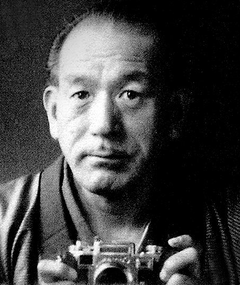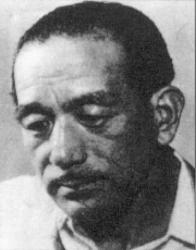|
|
| Ozu, Yasujiro
 |
Date of birth
12 December 1903, Tokyo, Japan
Date of death
12 December 1963, Tokyo, Japan
Mini biography
Yasujiro Ozu (December 12, 1903 — December 12, 1963)
Yasujiro Ozu was born in the old Fukagawa district of Tokyo, to a fertilizer merchant, in 1903.
In 1923, after a couple of years as an assistant teacher in rural Japan, Ozu was hired as assistant cameraman at the Shochiku Motion Picture Company.
Early in his career, Ozu began to experiment with an idiosyncratic film style that ran contrary to the conventions of Japanese or Hollywood cinema of the day.
He strove to reduce and simplify his film style; he cast such mainstays as the fade, the dissolve, and the pan from his cinematic palette.
He shot solely from a low camera angle, using a 50mm lens, and he subordinated spatial continuity to visual aesthetics.
“I formulated my own directing style in my own head, proceeding without any unnecessary imitation of others… For me there was no such thing as a teacher. I have relied entirely on my own strength.”

Ozu directed his first film in 1927,The Sword of Penitence. In 1932, he began to hit his creative stride with the touching comedy I Was Born, But…, which was his first commercial success. During World War II, he made few films such as There Was a Father.
After the war, Ozu reached his creative peak and made some of his finest films, including Late Spring, Early Summer, Floating Weeds,
An Autumn Afternoon, and his masterpiece Tokyo Story, which is generally considered one of the greatest films ever made.
The films of Ozu are simple, contemplative, and edged with nostalgia and sadness. Through the course of his long career, from 1927 to 1962, Ozu refined and narrowed the scope of his films to the bare essentials.
His oeuvre, which is almost completely confined to that of domestic dramas, is thematically quite coherent from one film to the next.
Though the particulars of the characters might differ, they are all snugly enmeshed in the same quiet world. There are no heroes or villains, no wild successes or great failures; his characters are ordinary people leading ordinary lives.
Conflict arises from natural changes in the relationship between parent and child, be it a daughter who is reluctant to marry and abandon her widowed father in Late Spring or a pair of young sons who realize the modest social position of their father in I Was Born, But….
Ozu’s remarkable sensitivity to the human condition and his nuanced understanding of the patterns of everyday life give these seemingly mundane conflicts a tremendous emotional power rarely found in conventional Hollywood dramas.
Lin his career, Ozu became the target of criticism by the iconoclastic directors of the Japanese New Wave.
Late in his career, Ozu became the target of criticism by the iconoclastic directors of the Japanese New Wave. Many decried his film style as rigid, while others criticized his refusal to address social issues.
His quiet, transcendent vision of humanity, however, has stood the test of time and has been an influence on such diverse Western directors as Wim Wenders, Jim Jarmusch, and Martin Scorsese. Ozu died of cancer in 1962. -- AllMovie guide
Director - Selected filmography
-
An Autumn Afternoon | 秋刀魚の味 | Sanma no aji (1962)
-
Late Autumn | Akibiyori (1960)
-
Floating Weeds - Ukigusa (1959)
-
Tokyo Twilight - Tokyo boshoku (1957)
-
Tokyo Story | Tokyo monogatari (1953)
-
Early Summer - Bakushû (1951)
-
The Munekata Sisters | 宗方姉妹 | Munekata Kyōdai (1950)
-
Late Spring - Banshun (1949)
-
Record of a Tenement Gentleman | 長屋紳士録 | Nagaya shinshiroku (1947)
|
|
|
| Choose an item to go there!
|
|

